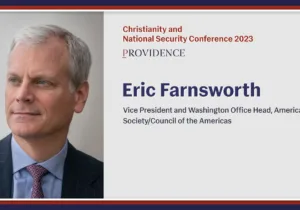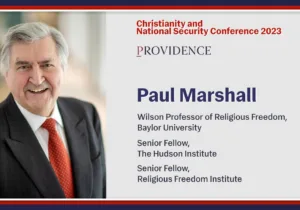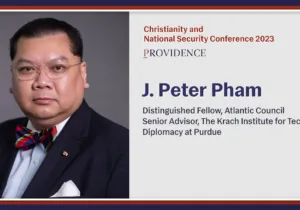Matthew Kroenig’s lecture at Christianity & National Security 2023.
Matthew Kroenig discusses great power conflict, international security architecture, and the battle of good versus evil. The following is a transcript of the lecture.
Well, thank you very much for that introduction, Mark. It’s a real pleasure to be back here. I think this is maybe the fifth or so year in a row I’ve been here, and it’s quite an honor to be the grand finale. So, thanks for your patience, and for sticking with us. When Mark first asked me to speak a few years ago, I realized that there were two really important parts of my life that I hadn’t really thought about how they worked together too much. I’m a Christian; I go to Christ Church in Georgetown, an Episcopal Church. Also, I’m a foreign policy expert. Again, these had been two important but separate parts of my life. Mark and Providence have forced me to think about how they come together.
I do think they come together in a number of ways, but the way I want to talk about it today is as it relates to good versus evil in the world. As a PhD in political science, I think political scientists often try to think about the world as states or these amoral actors going after their own interests. Russia, China, the United States – they’re all the same; they’re power-seeking great powers. I’ve learned that is not the right way to think about international politics. My new book, a working title is “Force for Good: How American Power Makes the World Safer, Richer, and Freer,” because I do think the United States has been a major force for good in the world over the past 75 years, indeed maybe the most important force for good in the world. So, that’s what I want to talk about for the next 20 minutes or so, and then in Q&A, we can talk about that or nuclear weapons or anything else you want.
After World War 2, it’s really remarkable what the United States did. The U.S. was left occupying large parts of Europe and Asia. In past periods of history, if a major power was left occupying places like that, it would set up a kind of formal empire of domination. But the United States didn’t want to do that; its first instinct was to come home. The Allies begged us, “No, please stay and save us from the Soviet Union.” So, it was kind of an empire by invitation. Instead of setting up a coercive empire, the United States and its allies set up what is sometimes referred to as a rules-based international system. I don’t love that term, but there’s not really anything better, so we’ll refer to it as that. I think the system had several parts.
First, it was setting up formal security alliance architectures in Europe and Asia, the places that had just been the sources of these two major wars, to make those places more secure and stable. Of course, NATO in Europe, bilateral treaty alliances with Japan, South Korea, Australia, the Philippines, and Asia, informal security partnerships in other parts of the world, including the Middle East. Speaking of good versus evil in the Middle East, of course, I think the attacks of October 7th brought that home to many of us that there is evil in the world.
In addition to the formal security architecture, the United States and its allies built this dense set of institutions. I think that’s why this system is referred to as a rules-based system because the density of formal agreements, institutions, bodies after 1945 was unlike anything we’d ever seen before. The UN Charter, NATO, the Nuclear Non-Proliferation Treaty, the World Trade Organization – all kinds of rules and institutions and agreements to try to make relations between states more stable and predictable. I think it makes sense that the United States, as a rule of law country at home, thought of this as a natural way to organize the world according to a kind of rule of law system. Completely unthinkable that if Nazi Germany had won World War II or if the Soviet Union had won the Cold War, they would have set up a similar type of system.
In addition, the United States brought its values into creating this system – a free-market economy at home, promoting free markets abroad, open market systems. Also, work to promote human rights, freedom, democracy – sometimes inconsistently, hypocritically, but whenever the United States had the option, it preferred democratic forms of government. People say sometimes, “Well, the United States doesn’t have a grand strategy; we muddle through. Every two years, we do something different with a change of administration.” I think that’s actually incorrect. This rules-based international system that the United States and its allies have set up has been the most consistent and successful grand strategy in international history.
So, what have been the results of this system? Has it been effective? If you just look at the data, the system has been remarkably effective. First, let’s look at international peace and security. Zero great power wars in 75 years – really unprecedented in human history. If you look at the percentage of humans who die in armed conflict from 1600 to 1945, 1 to 2% of humans could expect to die in armed conflict. Now that number is less than 1/10th of 1% – a huge reduction in that form of violence. If you look at prosperity, the average standard of living in the world, income per person is five times higher today than before this era of U.S. leadership in 1945. The same thing in the United States – the standard of living in the United States is five times higher today than in 1945. Poverty around the world – in 1945, 66% of the world’s population lived in poverty; today, that number is 10%. Still too high, but there’s been a lot of improvement.
Finally, what about democracy and human rights? You know, we often forget, but democracy has been a pretty rare form of government throughout human history. At the end of World War II, there were about a dozen democracies in the world; now, there are around 100. The world is objectively safer, richer, and freer today than at any point in human history. What has caused this? I do think it was the system that the United States and its allies constructed. You may be familiar with Steven Pinker – he’s a psychologist at Harvard and wrote some good books. He’s also kind of a radical optimist, pointing out that the world has gotten much better. But I think where he goes wrong is his explanation is too complicated.
He says, “Well, it’s because of globalization, nuclear deterrence, the end of the Cold War.” If you go through his six or eight explanations, I think they all boil down to essentially American power and engagement and the U.S. order. What drove globalization? It’s not something that just happened; it was the innovations and technologies invented in the United States, like the airplane and the internet, pushing other countries to open markets, to get the governments out of the economy, to adopt free-market systems of government. Nuclear weapons – I don’t think it’s Chinese, Russian, North Korean nuclear weapons that are keeping us safe; it’s American nuclear weapons.
The United States doesn’t use its nuclear weapons just to defend itself. What’s remarkable is the United States extends its nuclear umbrella to the entire free world. More than 30 formal treaty allies – NATO allies, Japan, South Korea, Australia, Philippines – arguably others rely on U.S. nuclear weapons for their security. Roughly 60% of global GDP today is protected by American nuclear weapons. It’s no accident that the richest, safest, freest parts of the world are the parts of the world that have been covered by the American nuclear umbrella.
The end of the Cold War is another variable that Pinker mentions, but again, that’s about American power – the United States and its free-world allies winning the Cold War and expanding this rules-based system, this zone of security, prosperity, and peace into parts of Eastern Europe that had been locked behind the Cold War. Then rushed to join the free world when they had the chance. I think that the system has been effective, but it’s under unprecedented challenges right now. Maybe you’ve heard about this over the past two days, but I think the greatest challenge that the system faces is from China.
China is the second-largest economy on Earth, second-largest military on Earth, and is a revisionist power. It has made it very clear that its goal is first to dominate Asia and then to replace the United States as the leading state in the international system. That would be an outcome that would be devastating for Americans but also for the rest of the world. I think sometimes people think, “Well, the United States has made mistakes in foreign affairs – Vietnam, Iraq, Afghanistan.” I think the United States has made mistakes in foreign affairs, but I think because this foundation of American power and the system we’ve built is so normal to us, we almost take it for granted.
We don’t imagine what would happen if that is pulled away. Some people think, “Well, if the United States steps back, all the good stuff will keep happening, and then we can eliminate these small mistakes.” I think that’s fundamentally wrong. If the United States pulls back, it’s not going to be goodness that fills the vacuum; it’s going to be Hamas, Iran, Russia, and China that fill the vacuum in a way that would be very bad for global interest and for American interest. I think a Chinese-led system – China is already exporting its authoritarian model.
A Chinese-led system would have less freedom at home in the United States and around the world. If China dominates the 21st-century technologies – artificial intelligence, quantum computing, and other things – it’s going to embed its autocratic values into that system. Also, in terms of prosperity, China’s economy isn’t run by free markets. It subsidizes its firms to give them an unfair advantage, places political minders in Chinese companies. Its international economic engagement is state-to-state – a lot of corruption, bad for human rights, bad for environmental standards.
I think a Chinese-led system might be good for some Chinese elites, but I think it would be worse for the peace, prosperity, and freedom of most people around the world and certainly for Americans. I do think making sure that the United States effectively competes with China and fends off this challenge is important. There is this new axis of autocracies threatening the system. The United States and its mostly democratic allies have built. Russia’s war in Ukraine is a good example. Russia is trying to establish a sphere of influence in Eastern Europe, reassert the Russian Empire in Eastern Europe. If that were to happen, it would be again bad for these systems but also worse for the people who would have to live under Russian domination.
If you talk to Estonians, Latvians, Lithuanians, Poles – they’re some of the most hawkish on Russia because they know what it’s like to live under Russian domination. They lived under Russian domination during the Cold War, and they don’t want to return to that. They’ve liked living in the free world over the past several decades. Of course, we have the challenge from Iran in the Middle East. The Biden administration’s Pentagon estimates that if Iran were to dash to build nuclear weapons, its breakout time now is about 12 days. We’ve had a 20-year effort to try to prevent Iran from building nuclear weapons, and we’re on the verge of failure.
In addition, Iran is the biggest state sponsor of terror, according to the State Department. Funding Hamas, Hezbollah, plotted to blow up Cafe Milano in Georgetown a few years ago to try to kill this Saudi ambassador. It has killed many Americans and has conducted attacks on American bases in the Middle East in the past few days. Moreover, these autocratic powers are increasingly working together. Xi and Putin have met a number of times. In one of their last meetings, Xi said to Putin, “There are changes in the international system that haven’t taken place in hundreds of years, and we’re driving those changes.” Putin said, “I agree.” China’s support to Russia – economic support is fueling Russia’s war machine. Iran is building drones that it’s providing to the Russians.
Russia, China, and Iran have conducted joint military exercises. In fact, the amount of collaboration among these autocratic powers is already greater today than the collaboration among the Axis powers on the eve of World War II. I think there is a real reason to be concerned. The United States and its allies in this rules-based system face serious challenges in all three of these theaters – a major war already in Europe, one brewing in the Middle East, and the possibility of a Chinese attack on Taiwan. Right now, China is testing America’s military alliance with the Philippines, encroaching on the Second Thomas Shoal – harassing and attacking Philippines ships as they try to access their own sovereign territory.
I was quoted in The Economist this week, which was an honor, as saying the world is more dangerous now than at any point than at the most dangerous times during the Cold War. I wish that weren’t true, but I think it is the case. I think this is essentially a battle of good versus evil – the United States and its democratic allies in the free world against these revisionist autocracies that want to tear down everything we’ve built. It’s going to be challenging, but we’ve made it through difficult times before, including in the first Cold War. I think if we invest in our own strengths, align with our allies, adapt, and revitalize this system for a new era – what are the new institutions and bodies that we need, building new alliances like the Quad in Asia, bringing together the UK, the United States, and Australia?
I think we need to be creative in what are the other things that we need to build. Maybe, most importantly, do we defend what we’ve built from those who want to tear it down? A lot to talk about, a lot going on in the world. Maybe I’ll finish my formal remarks there and open it up for Q&A and discussion.






